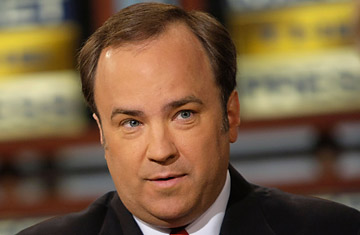
Former White House press secretary Scott McClellan speaks during a taping of Meet the Press in Washington
Nothing says summer in the nation's capital like tell-all testimony in front of a bunch of members of Congress with time on their hands and the fall election on their minds. On Friday the country will get a classic: the appearance of former White House press secretary Scott McClellan before the House Judiciary Committee. McClellan served as President George W. Bush's loyal spokesman for almost three years, only to surprise Washington early this month by turning on him in his new book What Happened, a 326-page indictment of an Administration he says "chose in defining moments to employ obfuscation and secrecy rather than honesty and candor."
Committee chairman John Conyers says McClellan's book "suggests that senior White House officials may have obstructed justice and engaged in a cover-up" in the outing of Valerie Plame, the CIA employee whose identity was revealed as part of a White House effort to discredit her husband. What Conyers "suggests," however, may also be misleading. The book adds some new details about Bush and Vice President Dick Cheney's involvement in the Plame outing, but there's nothing there to build a case on. For his part, McClellan says he doesn't have much more to offer on the subject. "Anything of significance I know about it is in the book," McClellan told PBS's Tavis Smiley on June 16.
There is one substantive way that McClellan's appearance could help Hill Democrats in their battles with Bush. The President has blocked his former senior adviser Karl Rove from testifying before Congress by claiming his advice is protected by executive privilege. Stan Brand, a Democratic lawyer who advised Conyers' committee on McClellan's testimony, says McClellan's appearance undermines Bush's claim of privilege for Rove, and "weakens the public perception and maybe the judicial claim of privilege."
Still, Democrats seem most interested in raking over the Plame story in search of any remaining political sparks with which to light an election-year fire. It appears they are hoping that the White House will do something stupid, like try to stop McClellan from testifying. Democrats tried to spook the White House by inflating the potential value of McClellan's testimony. McClellan himself hired the high-profile husband-and-wife legal team of Michael and Jane Tigar to defend him in case the Administration does try to play hardball. The Tigars specialize in defending unpopular clients — from accused Nazi camp guard John Demjanjuk to Oklahoma City bomber Terry Nichols and terrorist lawyer Lynne Stewart.
For all the stagecraft, we still don't know what happened in the anti-Wilson plot inside the White House. Wilson had accused the Administration of deceiving Americans by hyping Saddam Hussein's supposed search for nuclear fuel in Africa. McClellan's book sheds a little more light: Cheney called Bush the morning of Oct. 4, 2003, and Bush then ordered McClellan to tell the media that Cheney's chief of staff, I. Lewis (Scooter) Libby, had nothing to do with the Plame leak. Libby was later shown to have indeed leaked her identity, and was convicted of obstructing the inquiry into the scandal. (Bush commuted the sentence.) But we still don't know if Bush or Cheney knew they were peddling a lie in defending Libby or the other White House leaker, Rove. McClellan says he thinks Bush was deceived, just as he himself was.
The only real prospect for unearthing new facts comes from the subpoena issued last Monday by Henry Waxman, chairman of the House Government Oversight Committee, to Attorney General Michael Mukasey demanding transcripts of FBI interviews with Cheney and Bush in the Plame case. The FBI is awaiting orders from Mukasey's office, but don't hold your breath. Department of Justice spokesman Peter Carr says, "We have received the subpoena and are reviewing it." Waxman's office expects a continued stonewall from the Justice Department ahead of the noon Monday subpoena deadline.
So if no facts are forthcoming ... on with the show! McClellan's testimony will primarily serve as a free publicity session for him, though it's possible the sheer spectacle of a onetime Bush loyalist denouncing his former colleagues will generate some anti-Bush heat for Democrats. As for it undermining Rove's claim of executive privilege in any meaningful way, that's a long shot. The White House has ordered the Justice Department not to pursue the contempt charges brought against Rove. Which means that for now, Democrats in Congress will have to make do with McClellan for their summer dose of political theater.
